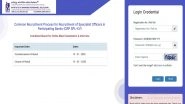Washington D.C, April 9: Working out for just five minutes can now reduce heart attack risks. A research has found an innovative five minutes workout that is not only time efficient but, reduces your heart attack risk, helps you think more clearly and boost your sports performance.
Preliminary results from a clinical trial of Inspiratory Muscle Strength Training (IMST), were presented at the Experimental Biology conference."IMST is basically strength-training for the muscles you breathe in with," said Daniel Craighead, lead author of the study. Number of Push-Ups You Can Perform Could Indicate Your Heart Attack Risk! Step-by-Step Method to Perform the Exercise Correctly.
Developed in the 1980s as a means to wean critically ill people off ventilators, IMST involves breathing in vigorously through a hand-held device - an inspiratory muscle trainer - which provides resistance. Imagine sucking hard through a straw which sucks back."It's something you can do quickly in your home or office, without having to change your clothes, and so far it looks like it is very beneficial to lower blood pressure and possibly boost cognitive and physical performance," he said.
During early use in patients with lung diseases, patients performed a 30-minute, low-resistance regimen daily to boost their lung capacity. But in 2016, University of Arizona researchers published results from a trial to see if just 30 inhalations per day with greater resistance might help sufferers of obstructive sleep apnea, who tend to have weak breathing muscles.
In addition to more restful sleep, subjects showed an unexpected side effect after six weeks: Their systolic blood pressure plummeted by 12 millimetres of mercury. That's about twice as much of a decrease as aerobic exercise can yield and more than many medications deliver."That's when we got interested," said principal investigator Professor Doug Seals.
Systolic blood pressure, which signifies the pressure in your vessels when your heart beats, naturally creeps up as arteries stiffen with age, leading to damage of blood-starved tissues and a higher risk of heart attack, cognitive decline and kidney damage.
While 30 minutes per day of aerobic exercise has clearly been shown to lower blood pressure, only about 5 per cent of adults meet that minimum. Meanwhile, 65 per cent of mid-life adults have high systolic blood pressure."Our goal is to develop time-efficient, evidence-based interventions that those busy mid-life adults will actually perform," said Seals.
The preliminary results showed that with about half the tests done, the researchers have found significant drops in blood pressure and improvements in large-artery function among those who performed IMST with no changes in those who used a sham breathing device that delivered low-resistance.
The IMST group is also performing better on certain cognitive and memory tests. When asked to exercise to exhaustion, they were also able to stay on the treadmill longer and keep their heart rate and oxygen consumption lower during exercise.
Some cyclists and runners have already begun to use commercially-available inspiratory muscle trainers to gain a competitive edge. But Seals and Craighead stress that their findings are preliminary and curious individuals should ask their doctor before considering IMST.
That said, with a high compliance rate (fewer than 10 per cent of study participants drop out) and no real side-effects, they're optimistic."High blood pressure is a major risk factor for cardiovascular disease, which is the number one cause of death in America," said Craighead. "Having another option in the toolbox to help prevent it would be a real victory."













 Quickly
Quickly


